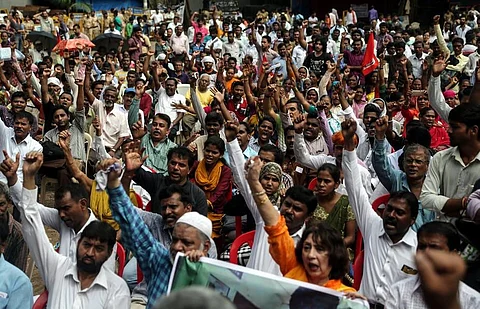
- Home
- Live Blog
- Breaking News
- Top Headlines
- Cities
- NE News
- Sentinel Media
- Sports
- Education
- Jobs

There seems to be a totally uncalled for controversy about the use of a word that the government has belatedly found repugnant even though it has been much in use over the years. The Centre has cited a court ruling and “advised” the electronic media not to use the word Dalit. This has naturally prompted criticism from Ambedkarite activists who have emphasized the fact that the scheduled castes had coined the term Dalit themselves. On August 7, the Information and Broadcasting Ministry wrote to the News Broadcasters Association and the Indian Broadcasting Foundation—both bodies of TV channels—conveying a June 6 directive from the Nagpur bench of the Bombay High Court asking the government to direct the media not to use the word Dalit. The letter from Amit Katoch, I&B Ministry director, said: “Media may refrain from using the nomenclature ‘Dalit’... and the constitutional term ‘Scheduled Caste’ in English and its appropriate translation in other national languages should alone be used.” The two associations are reported to be still “examining” the letter and have not conveyed the directive to the TV channels. It is not clear whether the Centre will send a similar advisory to the print media, and if it does when this is likely to happen. Experience indicates that the electronic media is unlikely to react strongly to such directives regardless of their implications for the media. It is the print media that is generally expected to come out with strong reactions. This is hardly surprising, since both radio and television, unlike newspapers, have been the creations of the government. In 1962, the Centre had asked the States not to use the use the word Harijan which the Scheduled Castes regarded as condescending or even downright offensive. Things are quite a bit different in respect of Dalit. Delhi University philosophy professor Kesav Kumar has underscored the fact that the Dalits had themselves coined the term Dalit to mark their “condemned” lifestyle and culture and to assert themselves against their oppressors since Dalit means “trampled on” or “downtrodden”. According to Professor Kumar, “For most Dalits, the word is not objectionable. It means a celebration of the Dalit lifestyle. Some Brahminised Dalits may have problems, (but) this is the language of liberation.”
The interesting part of the court order is that it came after a petitioner cited the Gwalior bench of the Madhya Pradesh High Court’s January order banning governments from using Dalit since it does not find mention in the Constitution of India or any other statute. This is indeed a strange stand to adopt because with the passage of time there will be a larger number of words used for much of our quotidian needs that may not be mentioned either in our Constitution or any other statute. This is a natural and expected happening. Will the nation be expected to spend much time quibbling over such words because they are not there in our Constitution or any of our other statutes or shall we accept the known fact that new words will get coined (almost every day in the case of English) and used, and we cannot wait for amendments to our Constitution and other statutes so that new words that we need to use (largely because of cultural changes) find a place in our statutes? As a Dalit activist has put it, “The word was evolved when Dalits started the Dalit Panthers Party to identify themselves and assert their voice. Dalit Panthers, Dalit Sahitya, Dalit Ashmita—all these expressions create a sense of pride.” After this, efforts by the government to ban the use of the word Dalit will only signify that the government is afraid of the use of the word because of the sense of pride, unity and self-assertion that it evokes among the community. Let us not exert ourselves to find the wrong reasons for defending any condemnable decision.